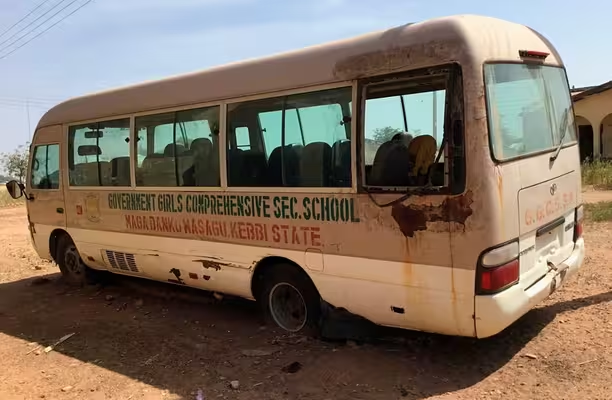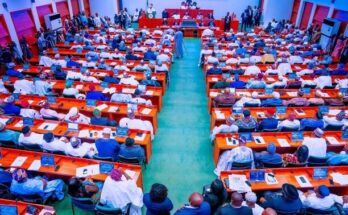By Chiagoziem Abosi
Edited by Sunkanmi Adewunmi
The heart of Kebbi State is trembling with grief and anger. In the early hours of Monday, 25 schoolgirls were whisked away from their dormitories at the Government Girls Comprehensive Senior Secondary School (GGCSS), Maga, by armed men. The vice principal, Malam Hassan Yakubu Makuku, was killed in the attack.
In response, Lieutenant General Waidi Shaibu, Chief of Army Staff, made an urgent operational visit to Kebbi and issued a stark command: troops must intensify intelligence-led rescue efforts day and night. He described the mission as non-negotiable, telling soldiers, “We must find these children … Success is not optional.”
Shaibu didn’t just talk he also met with local hunters and vigilantes, calling them “critical partners” because of their deep knowledge of the terrain. He urged them to work alongside the army to track the abductors, promising full military support.
He also visited the traditional ruler of Danko, Alhaji Abubakar Ibrahim Allaje, and the school’s principal, Hajiya Rabi Musa Magaji, to offer his condolences and assure them that the Army was fully committed to rescuing the missing schoolgirls.
A Grim Echo of Chibok
This terrifying event in Kebbi revives dark memories of a tragedy that gripped Nigeria more than a decade ago the Chibok schoolgirls abduction. In April 2014, Boko Haram militants stormed a secondary school in Chibok, Borno State, abducting 276 girls from their dormitories.
That kidnapping sparked the global #BringBackOurGirls campaign, but the path to justice has been long and painful. Even now, many of those girls remain missing. The survivors who returned have spoken of deep trauma, stigma, and the pain of rebuilding their lives.
According to parents of the Chibok girls, the impact has stretched across years. Reports say dozens of parents died from the emotional anguish and hopelessness after the abductions.
Chibok remains a haunting reminder: mass school kidnappings in Nigeria are not just tragedies,they are a recurring nightmare.
Why This Attack Is So Alarming
- Banditry and Kidnapping Have Evolved
Unlike the ideological insurgency of Boko Haram, many of today’s kidnappings in northwestern Nigeria are carried out by “bandits” armed criminal groups often motivated by ransom. This attack highlights how vulnerable schools remain, especially in remote areas. - Failure to Protect Soft Targets
The COAS’s plea for “intelligence-driven operations” suggests that security forces recognize a pattern: schools are now seen by criminals as soft, high-value targets. - Community Roles Are Critical
Shaibu’s call for local hunters and vigilantes to be deeply involved shows the necessity of leveraging local networks to navigate forests and terrain where these criminals hide. - Political & Emotional Stakes
With Chibok’s shadow still looming, there is enormous pressure on the government and security agencies not just to rescue the girls, but to prove that lessons were learned.
What Must Happen Next
- Relentless Rescue Operation: Troops must follow through on Shaibu’s orders. Intelligence, day-and-night patrols, and real coordination with locals will be key.
- Justice for the Vice Principal: Makuku’s death is not just a collateral tragedy; it must be treated as a grave crime.
- Support for Families: The anguish of parents left behind in Kebbi echoes that of Chibok families. They need clear communication, psychosocial support, and regular updates.
- Preventative Strategy: Beyond rescue, there must be a robust plan to secure schools physical security, early-warning systems, community watch.
- National Reckoning: If we are to claim “never again,” then there needs to be systemic reform in how Nigeria protects its children, especially in conflict-prone and bandit-affected regions.
Final Thought
When Shaibu says “we will restore peace and ensure children can attend school safely,” he’s not just promising a rescue, he’s invoking hope. But for that hope to be real, action must follow words.
History is repeating itself. But this time, Nigeria has a chance to change the ending.









This is a *familiar* tune in Nigeria, isnt it? From Chibok to Kebbi, it seems soft targets are still the preferred playground for kidnappers. The COAS promising intelligence-driven operations while simultaneously begging hunters for help is like asking a fish to climb a tree – innovative, but perhaps not the primary solution. #BringBackOurGirls was trending years ago; where was the never again then? Maybe its time we stopped reacting and started *preventing*. Until schools are secured like Fort Knox and criminals see them as verboten, this recurring nightmare will keep playing out. Lets hope the hope this time is more than just a hashtag.